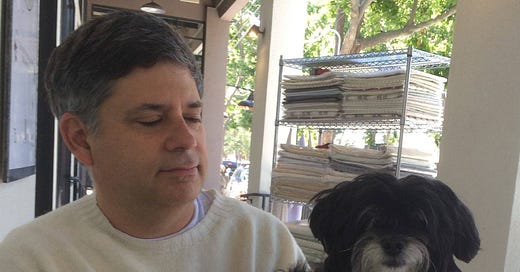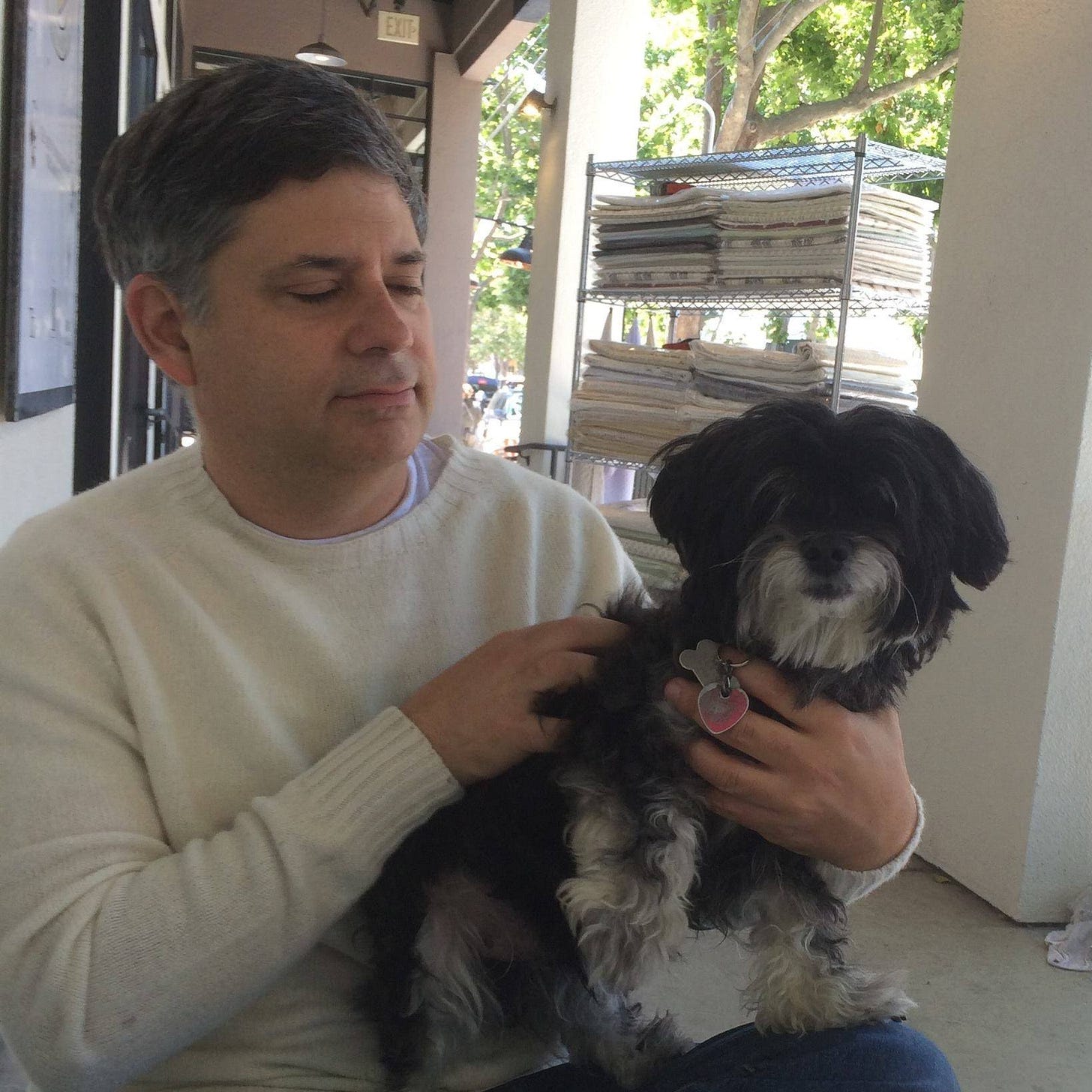Newton and I, a few months before his surgery, in 2018
[Note: The audio is a first pass, I’m new to this. I’ll update soon].
“Newton.” The name for me became almost as natural as my own. Depending on the audience, it is a reference to Sir Isaac Newton, and the Fig Newton cookie, now not as ubiquitous as it once was. I’ve written it, spoken it, whispered it, babified it, and bastardized it tens of thousands, if not a million times — always with love. I’m still saying it, automatically, even though he’s gone. The name will never not be that of my best dog.
Newton was 15 pounds, black with white patches on his chest, muzzle, and paws. He was my best friend, my sidekick, my interspecies child, my tamagotchi, and sag-e-nevisande (‘writer dog’, as his Persian-American admirers would call him).
On July 28, 2018, Newton became the 15th (I believe) American dog to undergo a cutting-edge mitral valve surgery performed by Dr. Uechi Massami at the Jasmine Clinic in Yokohama, Japan. Almost six years later, on July 16, 2024, he passed away in my arms after suffering a probable stroke. [Note: I go into great detail on the ethics and considerations around surgeries for animals in my forthcoming book about my and Newton’s 17+ years globetrotting together].
While I am grieving deeply, I am aware that every day after that surgery was a pure gift. All but one of the chords that anchored the valve that prevented oxygenated blood from flowing back into the left atrium of the heart had severed.
“Had you arrived a week later, he would likely not have made it,” the assisting surgeon told me a few days later.
Outlaw Dogs
Newton was a Havanese, known to (some) Cubans as the national dog of Cuba: a mix between Bichon and Maltese, with a dash of Poodle.
There were an estimated 4,000 Havanese in the US in 2012, most of which were descended from a few pairs of the breed carried off the island after the Revolution. Cuban leader Fidel Castro hated dogs, and labeled these erstwhile landowner-lapdogs ‘bourgeois appurtenances’ — and even, enemies of the state. Many Havanese owners left after the revolution, thinking they’d be back soon — only to remain exiles. Many of these dogs subsequently became homeless, and their numbers declined.
Early Life:
Newton was born May 4, 2007 in North Dakota. He had at least three other siblings, all various combinations of black and white. My then-partner Maria and I adopted him in mid-July of that year from a breeder in Connecticut, and lived with him in New York City for eight months, as I did volunteer duty in the SoHo passport office (President G.W. Bush’s administration suddenly required Americans have passports to travel to Canada and Mexico, creating a rush on passports and they conscripted diplomats to help).
This consular snafu bought me and Newton more time with Maria, before Newton and I had to ship out to my next posting at the US embassy in Abu Dhabi.
During that time the three of us got to know New York City even better, from the bodegas of Harlem to Greenwich Village and the Upper East Side — often with the assistance of a black-mesh Sherpa shoulder tote, which I bought for 50 dollars in a pet supply store on Amsterdam Avenue. I’ve never since found a better product, and it went out of production years ago. I’ve always wondered why, as it was the perfect balance between inoffensive and utilitarian; it was waterproof and light, and didn’t scream dog carrier.
In this nondescript, womb-like apparatus, Newton was completely incognito: He could see perfectly and was well ventilated, even on the hottest of days. Because his hair was black (Havanese don’t shed, so their silky-soft fur is called hair), he was virtually invisible. Newton wasn’t a barker, so he was whisper-silent as well. Still a puppy, Newton clearly felt safe there, in the bag, nestled up to the hollow of either my or Maria’s waist, the bag’s strap over our shoulder. I often felt like I was carrying around a shape-shifting cantaloupe, as he rolled from one side to the other, looking for the perfect spot.
When we exited some human spot, whether a movie theatre or a bookstore, I’d unzip the top of the bag six inches, and Newton would jump out to land gracefully, on all fours.
Invariably, someone would say, “There was a dog in there?”
Some would be alarmed for his welfare, and I’d feel somewhat obligated to demonstrate that it was made of soft mesh. It was, effectively, an urban hammock.
Next Up: Abu Dhabi Days





Dear Ethan,
I'm so sorry to learn of your deep loss of Newton. I hope all of those fond beautiful memories help you in your grief. I often think of what Queen Elizabeth said when she lost Philip: "Grief is the price we pay for love."
May that love forever sustain you Ethan.
Ethan, I am so very sorry for your loss of Newton, your miracle dog. Here’s to the book that will bring his story to the world.